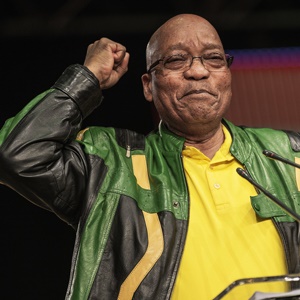
Jacob Zuma is stepping down from the ANC presidency, leaving behind a trail of wanton destruction. A mess of unspeakable magnitude.
Mark Gevisser, author of The Dream Deferred, Thabo Mbeki's biography, records Zuma's view of how Mbeki had risen to power in the ANC. Zuma's predecessor captured the party through the power of his intellect and his ability to draft documents.
How did semi-literate Zuma take control of the ANC 10 years ago, when he succeeded Mbeki, and put it on a path of destruction? Zuma captured the ANC through two powerful weapons: lies and unmitigated greed.
These had the effect of creating a third weapon: the ANC divisions he engineered and nurtured to his favour. He ruthlessly pursued a selfish strategy of personal survival and enrichment until the end of his second term. To borrow a phrase, Zuma never had permanent friends; he had permanent (personal) interests. You were either on his side or not.
Since he ascended to power he actively became involved in the factionalisation of the party and the tripartite alliance. He will end his reign at the party's 54th national conference with his reputation as a destructive factionalist firmly intact. Never mind what comes from his mouth. What matters is what he has done to destroy the noble dream the ANC once represented.
In fact, if his faction wins, his legacy will be immortalised. He will look back and feel fulfilled for achieving what only a few people would have imagined; that in just over two decades the governing party could be driven to the edge of the cliff.
For all the years that the ANC has been in power, it was only under Zuma's reign that it lost significant support. From the peak of two-thirds majority Mbeki bequeathed, Zuma worked consistently to bring the party down to the point where it is no longer in charge of key cities.
The losses are unlikely to stop. It's impossible to suggest the decline was not well deserved. It wouldn't be deserved had party members and leaders been caught unawares. Not only did the decline happen under their watch; they also egged him on as he mocked critics, threatened former comrades turned-foes and shunned counsel from well-meaning elders of the party.
He sowed seeds of distrust between the ANC and its voters – and the public at large. His lieutenants in the National Executive Committee irrigated. The invasive species didn't disappoint. The Gupta-led state capture and the general neo-patrimonialism of the ANC and the state became unstoppable.
The Tsunami of Polokwane never stopped. It simply mutated, sweeping aside even its original cheerleaders before it went right to the heart of the wellbeing of the Republic: the Constitution.
In his political report to the Polokwane conference in 2007, Mbeki pleaded with delegates to discuss who had divided the ANC. In response, delegates yelled: "You!"
Mbeki’s sin was that he had axed Jacob Zuma as his deputy in government. This was after Zuma's financial advisor and businessman Schabir Shaik was convicted and sentenced to 15 years for, among other things, bribing Zuma.
Zuma responded with a campaign to oust Mbeki, unleashing the powerful weapons of telling pure lies. To be frank, some of the lies appeared believable. But he knew for sure that he was lying.
He claimed that the criminal charges he was facing, that mirrored Shaik's, were part of a conspiracy to prevent him from being president. Mbeki, Zuma and his supporters claimed, was abusing state institutions like the NPA to persecute him. Mbeki gave credence to this conspiracy by contesting the presidency for a third term – a huge political blunder on his part.
Soon after convincing ANC members of his story of persecution that would enable him to ascend to the high office, it became clear Zuma himself had used state institutions. He was in possession of spy tapes leaked to him by police crime intelligence.
These were secret recordings of conversations of among others Bulelani Ngcuka, former head of prosecutions, and Scorpions boss Leonard McCarthy discussing whether Zuma should be served with an indictment before or after the 2007 ANC conference.
Zuma’s legal team would submit the tapes to the NPA along with his representations arguing why he should not be prosecuted. The charges were dropped and Zuma went on to become the president of the country.
A high court in KwaZulu-Natal had also added to the conspiracy that Mbeki was involved in a plot to use state institutions against a political opponent. The judgment was later overturned by the Supreme Court of Appeal (SCA). But not before the ANC under Zuma used it as a basis to recall Mbeki from government.
But the consequences of Mbeki’s recall such as the formation of the breakaway Cope is being used as an excuse not to give Zuma a taste of his own medicine even when the case for his recall can never be more compelling than it already is. It might be appropriate for the 54th national conference to pass a resolution to apologise to Mbeki.
The “spy tape” matter has come full circle. The Democratic Alliance fought for years to get the recordings to review and set aside the decision not to prosecute Zuma. He and the NPA opposed the DA's application. The tapes were eventually released.
Once released, the DA launched an application to set aside the NPA's refusal to prosecute Zuma for corruption, fraud and racketeering because there was nothing in the tapes that justified withdrawal of the charges. After a nine-year legal battle, Zuma conceded that the charges should not have been dropped.
The claim that Mbeki concocted charges suddenly expired and lost currency. But by that time, Zuma had been part of a criminal syndicate of state capture through which the Guptas, a family from India, took over the executive authority of South Africa.
Zuma’s rise to power was also punctuated by rape charges. His supporters claimed that Khwezi, the rape accuser, was a honey trap. But they couldn't substantiate it. Zuma was acquitted of the rape charge but the court found him morally guilty for failing to keep his stuff "in his pants." He apologised for having had sex without a condom knowing full well Khwezi, the daughter of his personal friend and Robben Island inmate, was HIV positive.
Zuma received a lot of praise from many quarters for his political tactics that saw Mbeki, a Sussex-educated economist, off the political stage. It was a remarkable achievement that demonstrated that you don't need formal education to make it to the highest office. Indeed, he once told university students that there were no solutions in books.
But it is precisely his lack of education, and the arrogance of having risen to the top without an education, that would in part drive Zuma on the path of his own destruction. South Africa's modern democratic system needs a high level of sophistication to run.
The drafters of our Constitution made a mistake by not specifying minimum requirements to be a president. We only have minimum requirements to be a Member of Parliament.
All Zuma had was the skill for personal political survival. This skill won him confidence of ANC members who voted for him but it wouldn’t clothe him with the capacity required to run government.
Zuma’s presidency has been a story of resurgent tribalism, criminal dealings and illicit profit-taking. The ANC was a stepping stone. It was a vehicle to be used for the man's insatiable greed.
He leaves behind the presidency of the party a shadow of its former self. The alliance didn’t come out any better during his presidency. Cosatu splintered. Under his leadership, three political parties that cut their teeth in the ANC were formed. The Congress of the People, the Economic Freedom Fighters and the African Democratic Change. For the first time after 1994, the SACP fought the ANC in a by-election.
Having accused Mbeki of abusing state institutions, Zuma was expected to help ensure, as the Constitution enjoins him to, that they are effective. But no. The accusation has proved to be an unsophisticated attempt to deflect what was to come: a concerted campaign to destroy state institutions for Zuma’s personal survival.
The once-efficient SARS is under threat of being destroyed. The National Treasury is bleeding as Zuma actively sought to weaken it. The national executive over which Zuma presides has lost its integrity, having been appropriated by private interests in what a group of academics correctly described as a “silent coup”.
The National Prosecuting Authority serves as Zuma's high-profile private defence law firm. The Presidency has been hollowed out. And cabinet ministers no longer enjoy public respect. Like Zuma, many are facing criminal charges.
The courts, however, remain robust and independent. It was not for his lack of trying that the courts have continued to restraint him. He once tried to extend the Constitutional Court term of former Justice Sandile Ngcobo by appointing him chief justice.
The move was challenged resulting in a Constitutional Court judgement that suggested Zuma was trying to introduce a form of bribery in the appointment of judges. This, the Constitution Court said, was unconstitutional. It was under Zuma that the government ignored a court order to arrest Omar al-Bashir.
He and the NPA tried in vain to ignore the SCA order to release the spy tapes. He also tried to destroy the Public Protector's office as part of his selfish strategy to protect illegal benefits that he accrued in Nkandla. Cabinet task teams were set up to discredit Thuli Madonsela. We are a better country for her courage to stand for what's right.
On the positive side, ironically, Zuma's poisonous rein has resulted in resurgence of civil society activism and growing opposition parties as South Africans fight back.
It is civil society and opposition parties that are largely responsible for bringing into the open what Zuma’s presidency has been about.
The court victories against Zuma have exposed his selfishness. He doesn't care whether his actions have negative consequences for his party or the country. He probably would die in battle defending Dudu Myeni rather than South Africa.
On December 13, the High Court in Pretoria used the word "reckless" at least four times in two pages of the 72-page judgement to describe Zuma's application to review and set aside Madonsela's State of Capture report. The truth is, since Polokwane, Zuma's politics have been driven by recklessness.
Through his reckless mismanagement of the economy, unemployment and poverty are at a record high. Public confidence in state institutions is at an all-time low. Our reputation in international relations is in tatters.
Zuma has been a thoroughly reckless leader. He will go down in history as the most reckless president the ANC ever had.
- Mkhabela is a fellow at the Centre for the Study of Governance Innovation (GovInn) at the University of Pretoria.
Disclaimer: News24 encourages freedom of speech and the expression of diverse views. The views of columnists published on News24 are therefore their own and do not necessarily represent the views of News24.




 Publications
Publications
 Partners
Partners























